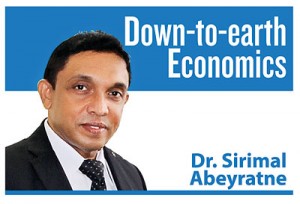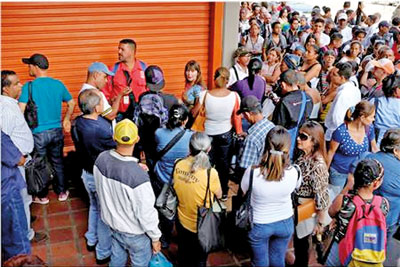Beauty and the beast
View(s):Perhaps, many Sri Lankans know about Venezuela because it is a country of many “Miss World” winners. In fact, Venezuela has maintained even a world record for being the country with the most number of Miss World winners! I don’t think that Sri Lankans had any other good reason to take note of Venezuela which is located on the other side of the globe.
About 40 years ago Venezuela was one of the richest countries in the world. In 1980, its per capita GDP was more than US$4,000; it was then the richest country among all Latin American countries. During this time, Sri Lanka’s per capita income was just $460 only.
Venesuela also has the largest proven oil deposits among all of the oil producing countries in the world. This was, in fact, the major factor that led Venezuela to be one of the richest countries in the world. Many of the world’s largest multinational companies came and invested there with the government in the country’s oil industry.
Since then, the oil industry flourished and became the major contributor to the country’s export income and government revenue.
Then everything got messed up, starting from 1999.
The beauty of Venesuela has got washed away now; today it draws world attention for an ill-fame: It is, perhaps, the most crisis-ridden country in the world with a massive humanitarian catastrophe. I thought of bringing this issue not just for information, but for warning as well.
Fighting for a piece of bread
Venesuela suffers from widespread hunger, which has worsened from year to year since 2014; people are lined up at the bakeries for a loaf of bread. They even loot bakeries for something to eat; they are fighting with one another for a piece of bread.
Government regulates not only the bread prices, but also the bread types as bakeries are restricted to baking anything other than basic bread. Police keep catching bakery owners for violating regulations and hoarding flour. Actually, government regulations and controls are not new things there.
Thousands of people cross the border everyday to Colombia to buy food. But that’s only a few who can afford to pay for that. Black markets are flourishing. It is not just food; there is a massive supply shortage of all basic needs, including medicines. About 60 per cent of basic medicines is not available in the market, according to the news reports.
The problem is not only in a supply shortage but also the rapid loss of money value due to hyper-inflation. The current rate of inflation is over 82,000 per cent; prices continued to double every two or three weeks. Annual inflation forecasted for 2018 is 1 million per cent!
BBC reported on August 20 the prices of few commodities: A 2.4kg raw chicken costs 14,600,000 bolivars – the Venezuelan currency, in the capital city Caracas; but in US dollars, it is just $2.22 only. One kg of rice was sold at 2,500,000 bolivars, equivalent to $0.38. With hyper-inflation, commodity prices have increased to millions so that Venesuelan currency has become virtually worthless.

People wait in front of a closed metro station after a blackout in Caracas, Venezuela August 29, 2018. REUTERS/Marco Bello
Too many zeros
A few days ago the government implemented a magical solution to the problem of “millions” in local currency transactions; first, it was to cut down “five zeros” from the end and, then to change the second name of the currency. The old bolivar was known as “bolívar fuerte,” which was replaced by a new currency with a new name “bolívar soberano.”
The change in the currency denominator means, for instance, an amount like 1,000,000 old bolivars is now equivalent to 10 new bolivars after erasing the last five zeros. As a result, a one kg of rice that was sold earlier for 2,500,000 old bolivars is now sold at 25 bolivars!
The cut down in five zeros of the local currency has also altered the international exchange rate. Venezuela had adopted a fixed exchange rate pegged to the US$ at the rate US$1 = VEB 1,600 old bolivar; this is, however, only the official rate. According to the black market exchange rate which was dropping fast daily, US$ 1 costs many millions of bolivar.
Confusing exchange rate
Venesuela’s exchange rate arrangement is, however, confusing as there are multiple exchange rates; this means, for instance, any imported commodity can be either very cheap or very expensive, depending on the exchange rate that is applied on it.
There were few rates in 2017 starting from the lowest official exchange rate of VEB 10 per $1, to a higher one as VEB 710 per $1 or another little higher rate of VEB 3,000 per US$. In the black market it was VEB 250,000 per $1 by mid-2018, which has been traded there even for VEB 4 million per $1.
The system has also opened the door for corruption; buy at an official rate and sell at the black market rate. Well, you really need to be a “somebody” to do so, because ordinary people cannot creep through foreign exchange controls.
Trying to get out
As hunger, supply shortage, hyper-inflation and tightening regulations are sweeping the nation, many began leaving the country. During the past four years, about two and half million people have left Venesuela. The families who cannot afford to pay for transport to a neighbouring country are, walking days with their families to reach their destination.
It is even sad to find that many of the people who are leaving Venesuela belong to the educated and middle-class! This means that the country is losing even the “last productive resource” that they have and, they need for any turnaround of the Venesuelan economy and its future development.
What went wrong?
It is not only interesting but also shocking to know why such an oil-rich prosperous country had fallen today to poverty and misery with a humanitarian catastrophe. It is all about “bad” economic policies which promoted “living beyond means.”
Some people call the policies as socialist! Apparently it is also not without reason. When oil prices were rising in the world market, the government could expand its spending; the government started spending billions of revenue from oil to finance social programmes and subsidies.
You can spend without limits during easy times, but it cannot be reversed during difficult times! When oil prices were falling in the world market, the government had to borrow.
The government wanted to expand its control over oil companies which was opposed by some multinationals. The net result was that those who opposed were expropriated! It was no different from “killing the goose that lay golden eggs.” Then the country started tightening import controls and adopting foreign exchange controls to stop foreign exchange outflows.
Venesuela is also one of the highly indebted countries in the world today. As both oil exports and prices have gone down over the years, Venezuela cannot finance both its debt repayment and import expenditure. It cannot borrow either as the country’s credit worthiness has deteriorated.
As inflation started picking up, the government also tightened price controls. It has made the problem worse, as the controlled prices were below the cost of production, the policy has ousted many private firms out of businesses. This has aggravated the supply shortage.
Lessons for both worlds
With Venezuela stopping the publication of economic data a few years ago, the current actual economic status is unknown; what is revealed is mostly the information from the daily life on the streets. The tragedy of Venesuela teaches many lessons to both worlds – developed and developing. I am certain that you can also pick up some of these that are familiar to you.
(The writer is a Professor in Economics at the Colombo University. He can be reached at sirimal@econ.cmb.ac.lk)


